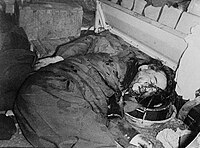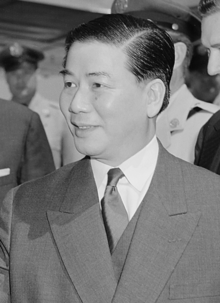Nguyễn Văn Nhung

Major Nguyễn Văn Nhung (died January 1964) was an officer in the Army of the Republic of Vietnam (ARVN). The bodyguard of General Duong Van Minh, Nhung was a professional military hitman who was reputed to have etched a line on his revolver for each of his killings.[1] He was well-known for his role in the November 1963 coup d'état that ousted President Ngo Dinh Diem from office. During the coup, Nhung executed Diem, his brother Ngo Dinh Nhu, and Colonel Le Quang Tung, the loyalist commander of the Army of the Republic of Vietnam Special Forces. An investigation led by General Tran Van Don, another coup plotter, determined that Nhung had repeatedly stabbed and shot the Ngo brothers. Following Nguyen Khanh's successful January 1964 coup against Minh's military junta, Nhung was executed. His death sparked public demonstrations by those who believed that it was a sign that Khanh was going to restore the remaining members of Diem's regime back to power.
Tung assassination

On 1 November 1963, a group of ARVN generals orchestrated a coup against President Ngo Dinh Diem. Nhung was an army officer who served as the bodyguard of one of the plotters, General Duong Van Minh. The plotters summoned a group of ARVN officers to the Joint General Staff headquarters at Tan Son Nhut Air Base, on the pretext that they were going to attend a lunch meeting.[2] Among those invited was the loyalist commander of the Army of the Republic of Vietnam Special Forces, Colonel Le Quang Tung. At 13:30 (UTC 06:30), General Tran Van Don announced that a coup was taking place. Most of the officers rose to applaud, but Tung did not, refusing to join the coup. He was taken away by Nhung, all the while shouting "Remember who gave you your stars!"[2][3][4]
At 16:45, Tung was forced at gunpoint to talk to Diem on the phone, telling the president that he had ordered his special forces to surrender. Minh then ordered Nhung to execute the Diem loyalist. Tung had failed to convince the president to surrender and still commanded the loyalty of his men. The other generals had little sympathy for Tung, because the special forces commander had disguised his men in regular army uniforms and framed the generals for the Xa Loi Pagoda raids in August.[5][6] The generals were well aware of the threat that Tung posed; they had discussed his elimination during their planning,[7][8] having contemplated waging an offensive against his special forces.[9] At nightfall, Nhung took Tung and Major Le Quang Trieu—his brother and deputy[3][4]—hands tied, into a jeep and drove them to the edge of the air base. Forced to kneel over two freshly dug holes, the brothers were shot into their graves and buried.[5]
Diem and Nhu assassination

By the next morning, the loyalist forces had collapsed. The brothers agreed to surrender, and coup plotter Don promised them safe passage out of the country.[10] In the meantime, Minh left Joint General Staff (JGS) headquarters and travelled to Gia Long Palace in a sedan, accompanied by Nhung. He arrived at the palace at 08:00 in full military uniform to supervise the arrest of Diem and Nhu for the surrender ceremony.[11]
However, the Ngo brothers were not there—they had escaped from Gia Long Palace via a secret tunnel to a safehouse in Cholon the previous night.[11][12][13] Diem and Nhu had communicated with the generals via a direct phone link from the safehouse to the palace, giving the false impression that they were still besieged.[13] Having been informed of Diem and Nhu's whereabouts, Minh dispatched a group of officers and troops—which included Nhung—to arrest them. He was aware that the brothers had left the safehouse to go to St. Francis Xavier's Church. Led by General Mai Huu Xuan, the officers took a M-113 armoured personnel carrier (APC), four jeeps, and several soldiers to Cholon. As they left, Minh gestured to Nhung with two fingers, taken to be an order to shoot the brothers.[13][14]
The soldiers arrived at the church and promptly arrested the brothers, tying them with their hands behind their backs. After the arrest, Nhung and Major Duong Hieu Nghia sat with Diem and Nhu inside the APC, and the convoy departed for Tan Son Nhut. They stopped at a railroad crossing on the return trip where, by all accounts, the brothers were assassinated. An investigation by Don later determined that Nghia had shot the brothers at point-blank range with a semi-automatic firearm and that Nhung sprayed them with bullets before repeatedly stabbing their bodies with a knife.[15]
During the journey back, Nghia gave his account of the assassinations to military headquarters: "As we rode back to the Joint General Staff headquarters, Diem sat silently, but Nhu and the captain [Nhung] began to insult each other. I don’t know who started it. The name-calling grew passionate. The captain had hated Nhu before. Now he was charged with emotion."[16] When the convoy reached a train crossing, Nghia said that Nhung "lunged at Nhu with a bayonet and stabbed him again and again, maybe fifteen or twenty times. Still in a rage, he turned to Diem, took out his revolver and shot him in the head. Then he looked back at Nhu, who was lying on the floor, twitching. He put a bullet into his head too. Neither Diem nor Nhu ever defended themselves. Their hands were tied."[16]
Don and other officers were stunned when the corpses arrived at JGS headquarters. Don confronted Minh in his office, and while they were remonstrating, Xuan entered the room. Unaware of Don's presence, Xuan snapped to attention and stated in French, "Mission accomplie".[16] Despite Don's investigation,[15] nobody was ever prosecuted for the killings.[17]
Death
Following the coup, Nhung's commanding officer, General Minh, became the President of South Vietnam, ruling through a military junta known as the Military Revolutionary Council.[18] After three months of rule, which was criticised for its lack of direction,[19][20] General Nguyen Khanh deposed Minh in a bloodless coup before dawn on 30 January 1964. Minh was briefly put under house arrest, while Khanh ordered that Nhung be disposed of. One of Khanh's men took Nhung to the garden of a Saigon villa and forced him to kneel, before executing him with a single gunshot to the back of the head. Nhung's death led to protests among the Saigon public, who took the killing to be a signal that the remaining members of Diem's regime would be reinstated to positions of authority.[21]
Notes
- ^ Hammer, p. 298.
- ^ a b Jones, p. 408.
- ^ a b Tucker, p. 227.
- ^ a b Karnow, p. 321.
- ^ a b Jones, p. 414.
- ^ Hammer, p. 290.
- ^ Karnow, p. 310.
- ^ Jones, p. 325.
- ^ Jones, p. 388.
- ^ Karnow, p. 322.
- ^ a b Jones, p. 418.
- ^ Hammer, p. 293.
- ^ a b c Karnow, p. 323.
- ^ Jones, pp. 416–417.
- ^ a b Karnow, p. 326.
- ^ a b c Jones, p. 429.
- ^ Jones, p. 180.
- ^ The Overthrow of Ngo Dinh Diem, May-November, 1963. Pentagon Papers. Daniel Ellsberg. pp. 201–276. Retrieved 2008-06-10.
- ^ Shaplen, p. 213.
- ^ Karnow, pp. 350–354.
- ^ Karnow, pp. 354–355.
References
- Hammer, Ellen J. (1987). A Death in November. New York: E. P. Dutton. ISBN 0-525-24210-4.
- Jones, Howard (2003). Death of a Generation. New York: Oxford University Press. ISBN 0-19-505286-2.
- Karnow, Stanley (1997). Vietnam: A history. London: Penguin Books. ISBN 0-670-84218-4.
- Shaplen, Robert (1965). The lost revolution: Vietnam 1945–1965. Andre Deutsch.
- Tucker, Spencer C. (2000). Encyclopedia of the Vietnam War. ABC-CLIO. ISBN 1-57607-040-0.
{{cite book}}: Check|isbn=value: checksum (help)
